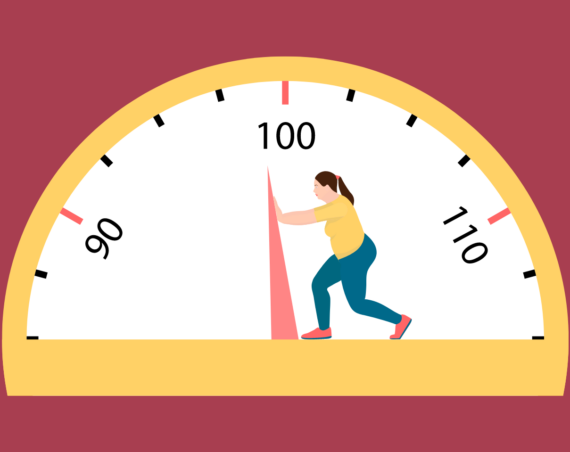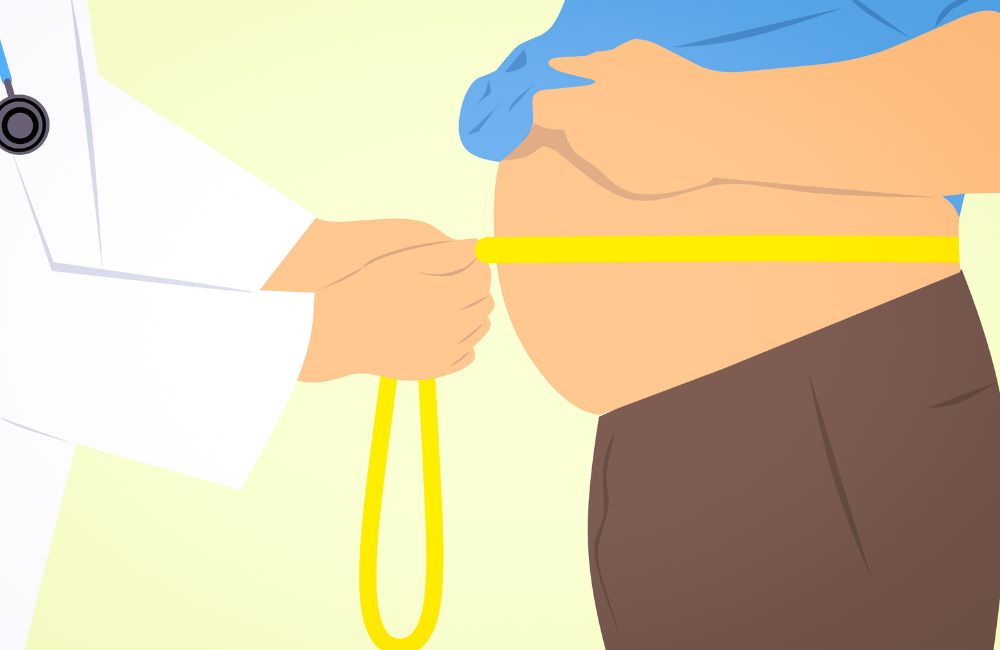
Despite what you hear, weight loss is not just about diet and exercise. If you’ve been feeling as if you’re doing everything you can but not losing weight, here are the unexpected reasons why.
Let’s face it, weight loss is hard.
With hundreds of diets, detoxes, cleansing juices, and supplements on the market, the media is making a killing out of our struggles.
If you feel like you can’t lose weight, we may have the answer for you.
Let’s look at 10 common reasons why you aren’t losing weight and how to overcome them, according to experts.
1. Age
Unfortunately, the fountain of youth has yet to be discovered. There’s no escaping getting older.
As we age, our metabolism tends to slow down. A slow metabolism can hinder your ability to lose weight.
This has a lot to do with our muscle mass. As we age, we often become less active than we were when we were younger.
When we aren’t moving as much, we start to lose muscle mass and gain more body fat. That muscle we are losing is what helps us to rev up our metabolism.
To make weight loss progress, consider adding more activity to your routine as you are able. This will ideally include a mixture of low-impact cardio and strength training exercises.
2. Calories
To meet our weight loss goal and maintain a healthy body mass index (BMI), we need to be in a calorie deficit.
This means consuming fewer calories than you are burning. If you’re struggling with weight loss, it might be a good idea to track your food intake.
The best way to do this is by creating a food diary. This can be physical, such as a notepad or journal, or with an app on your phone.
A food diary is a great tool to identify those high-calorie foods we didn’t realize were sabotaging our weight loss goals.
It also helps us to better understand the number of calories we consume normally. This helps us see what adjustments we can make to choose fewer calories without relying only on willpower.
Even if you are choosing healthy foods, you can have too much of a good thing.
A dip too far in the other direction will have a negative impact as well.
A low-calorie diet can be harmful to your metabolism. In order to know what calorie range would work best for you, there’s a lot to examine.
Consider meeting with a Registered Dietitian (RDN) for your personal calorie range recommendations.
If you don’t feel like this is an option for you, there are online tools available to give you a general idea, such as the USDA DRI calculator.
The number of calories you consume will dictate your weight gain or weight loss.
Another easy way to do this is to monitor portion sizes.
Be sure to read labels for calorie and serving size information.
You can also add in exercise to increase the calories you burn daily.
3. Diet Quality
The quality of your diet may be the key to what is holding you back from weight loss.
A diet high in processed foods often leads to over-eating less valuable nutrients.
Instead, choose more whole foods in your diets such as fruits, veggies, whole grains, lean meats, beans, legumes, nuts, and seeds.
Whole foods are high in essential vitamins and minerals as well as filling nutrients such as fiber, healthy fats, and protein.
Highly processed foods and drinks often contain high amounts of carbohydrates, which are easily over-eaten.
This is especially true for snacks such as chips, crackers, cookies other packaged goodies, and sodas.
Not only are these healthy foods a better alternative, for meals and snacks, but they can also help to avoid chronic conditions such as high blood pressure, impaired blood sugar, or obesity.
4. Resistance training
As mentioned earlier, more muscle means a faster metabolism.
Incorporating resistance training into your exercise routine can make a significant impact on your weight loss and overall health.
Not only will it help to improve muscle mass and cut down on body fat by way of weight loss, but it can help to ensure mobility as you age.
Good exercise habits are the key to a healthy lifestyle that includes maintaining a healthy weight.
The Centers for Disease Control and Prevention recommends at least 2 days a week of strength training exercises.
These exercises should work all major muscle groups (legs, back, abdomen, chest, shoulders, and arms).
Be sure to take adequate rest days in between to allow your muscles to recover and avoid injury.
5. Cardio
Along with resistance training, cardio is also a key component in any exercise routine.
To fully benefit from your physical activity, a mixture of both these forms of exercise is essential.
Cardio is an aerobic exercise that gets your heart rate up. This could include workouts such as walking, jogging, skipping, jumping rope, biking, hiking, and the like.
Adding this to your routine can also help to get you over that weight loss plateau.
The Centers for Disease Control and Prevention recommends 150 minutes a week of moderate-intensity aerobic activity each week, such as a brisk walk, 75 minutes of vigorous-intensity aerobic exercise such as jogging, or a mixture of both.
6. Sleep
It may sound surprising that sleep is considered one of the many important factors in weight loss.
A recent study conducted in China on nearly 22,000 participants showed a lack of sleep resulted in a higher likelihood of being overweight and obese.
Those in the study who had less than 7 hours of sleep a night had an increased risk for weight gain, specifically around their midsection (1).
Sleep deprivation can wreak havoc on our hormones, specifically those that target our appetite.
These hormones, known as Leptin and Ghrelin, are what signal our body that we are either full (Leptin) or hungry (Ghrelin).
When we are not getting enough sleep during the night, Leptin will decrease, and Ghrelin will increase (2).
This means we will feel hungry more often and are more likely to snack or overeat when we are tired.
Make sure to make your sleep a priority.
If you have a hard time falling asleep, avoid the use of blue light from your television, smartphone, or tablet at least 30 minutes before bed.
Avoid eating a large meal or enjoying any sugary treats or caffeinated drinks prior to hitting the hay.
7. Carbohydrates
Often our most loved foods are carbohydrates.
Pasta, bread, rice, pastries, sweet treats, it can be hard to say goodbye to some of these foods.
If you are choosing a diet high in carbohydrates, that may be why you are struggling to lose weight.
High-carb foods are great for supplying quick energy.
Unfortunately, they don’t do much to keep us feeling full.
Instead, swap out some of those carbs for foods higher in fiber, healthy fats, and protein.
This could include a small serving of mixed nuts or fresh fruit.
This can help you to keep your calories and portion sizes in check without feeling starved.
It can also ensure a good blood sugar balance which can better control your hunger levels.
8. Hydration
Water is essential for life.
Most of us know this.
Unfortunately, water doesn’t have any flavor or appeal-like soda, juices, and other flavored beverages.
Because of this, it can be easy to forget to make sure we are getting enough water during the day.
Adequate hydration is not only essential for our health, but it can also help to keep us from snacking.
This is because water takes up space in our stomach, sending signals to our brain that we are full.
A small study on 14 healthy males showed consuming roughly 20 ounces of water 30 minutes before a meal reduced intake by almost a quarter [3].
Aim to consume at least eight 8-ounce cups of water daily.
9. Medical Conditions
Certain medical conditions, as well as medications, can make losing weight more of a challenge or even result in weight gain.
Conditions such as polycystic ovarian syndrome (PCOS), Hypothyroidism, or thyroid removal result in changes in hormones that can affect our weight.
Certain life stages such as menopause can have an effect as well.
This is because hormones can have a strong influence on our weight.
Other conditions such as sleep apnea can also have an effect due to alterations in hormones.
If you think you might have one of these conditions or are unsure if you are taking a medication that might be resulting in weight gain, speak to your healthcare provider.
10. Yo-Yo Dieting
Frequent dieting can wreak havoc on our health.
Repeated weight loss and re-gain, known as yo-yo dieting or weight cycling, is linked to increased health risk.
Psychological effects and stronger association with binge eating disorder have also been linked with this behavior (4).
Restrictive diets are often not sustainable.
Because of this, we will often eventually go back to our regular eating habits, leading to weight regain.
Instead of making multiple big changes to your diet, choose something small to focus on.
Work on changing your habits instead of your entire style of eating right away.
For example: if you currently drink 2 sodas a day, try cutting down to just one.
Continue to make these small changes over time so you can adjust and better make them part of your routine.
The Bottom Line
If you often think to yourself “Why am I not losing weight? Consider these common reasons.
No matter how you slice it, weight loss is always going to be hard.
These tools in hand, it can help get you started in the right direction.
If you are continuing to struggle, consider working with a Registered Dietitian to help get more specific advice.
Also, check out:
The Best 3-Day Full Body Workout to Get Lean & Build Muscles
Try This Simple 15-Min Body-Weight Workout To Burn Fat & Get Lean


